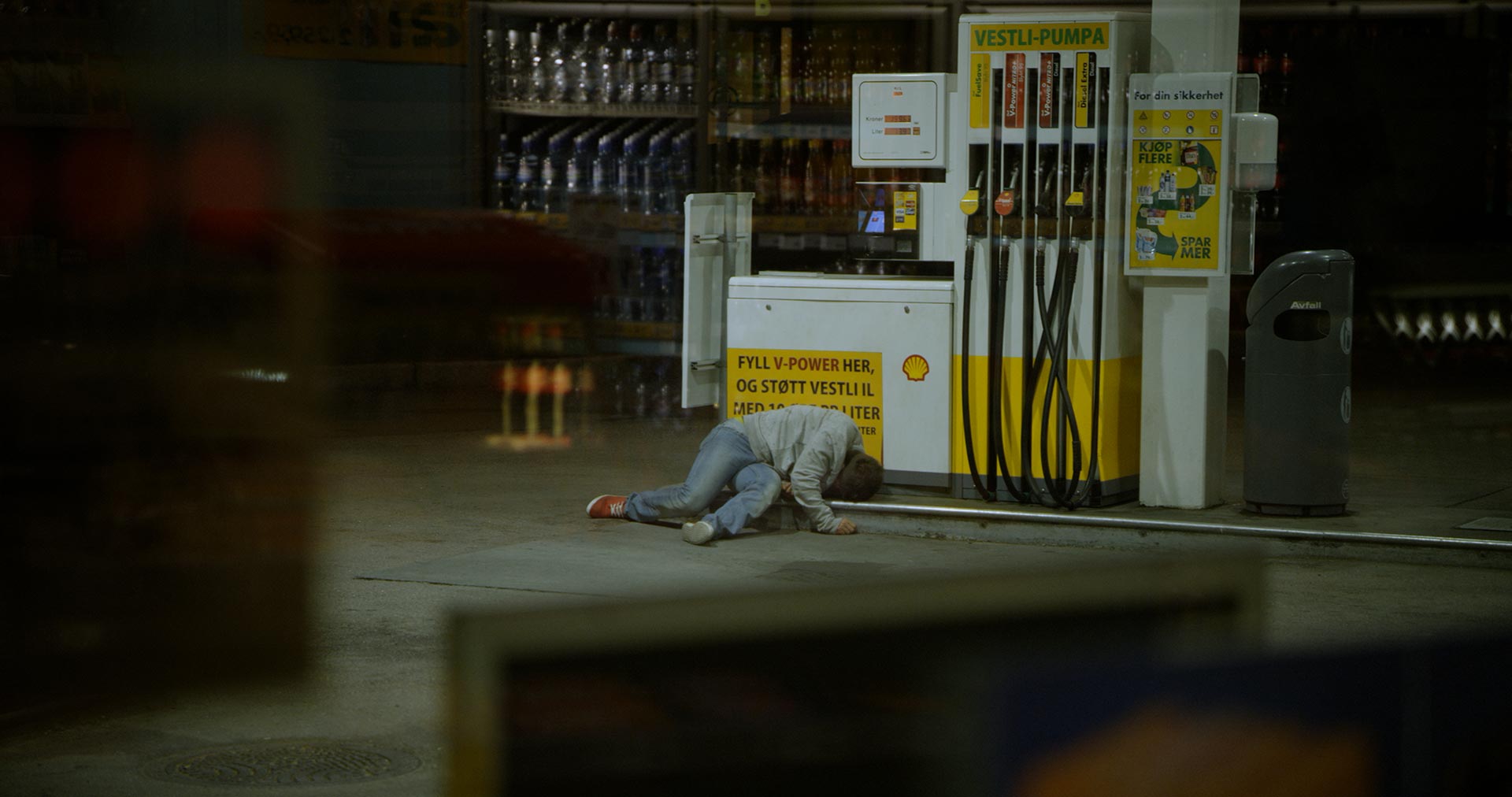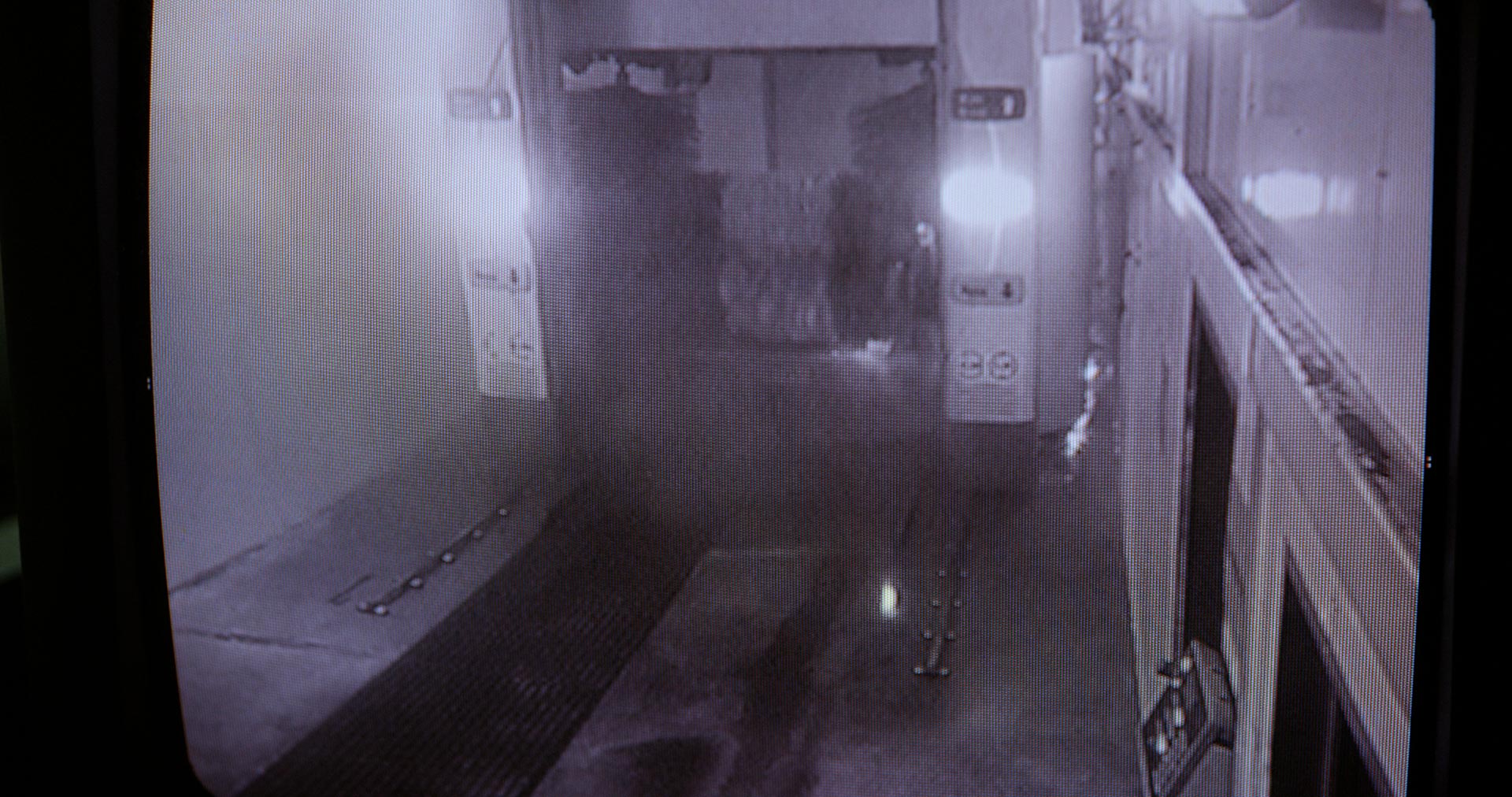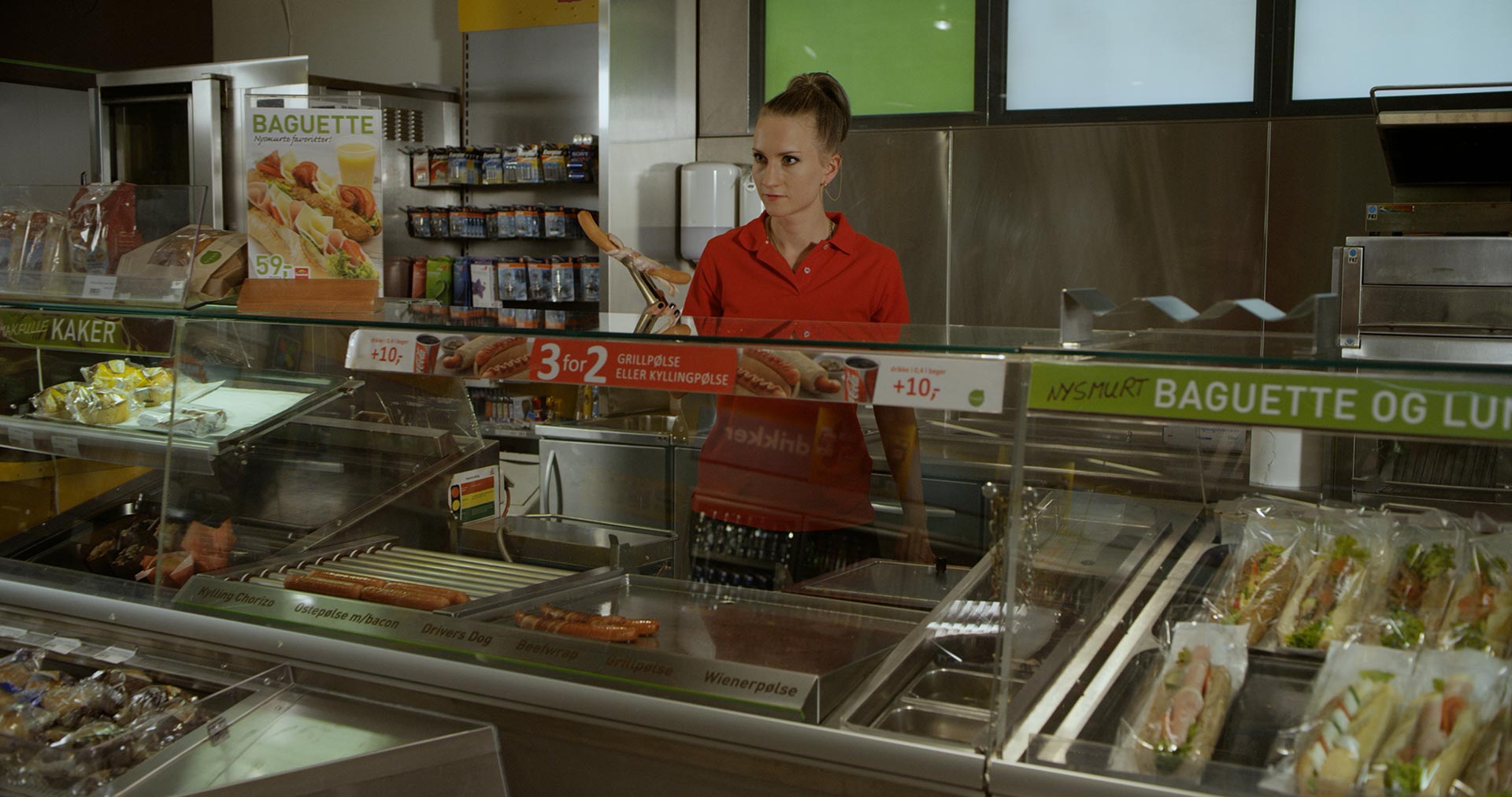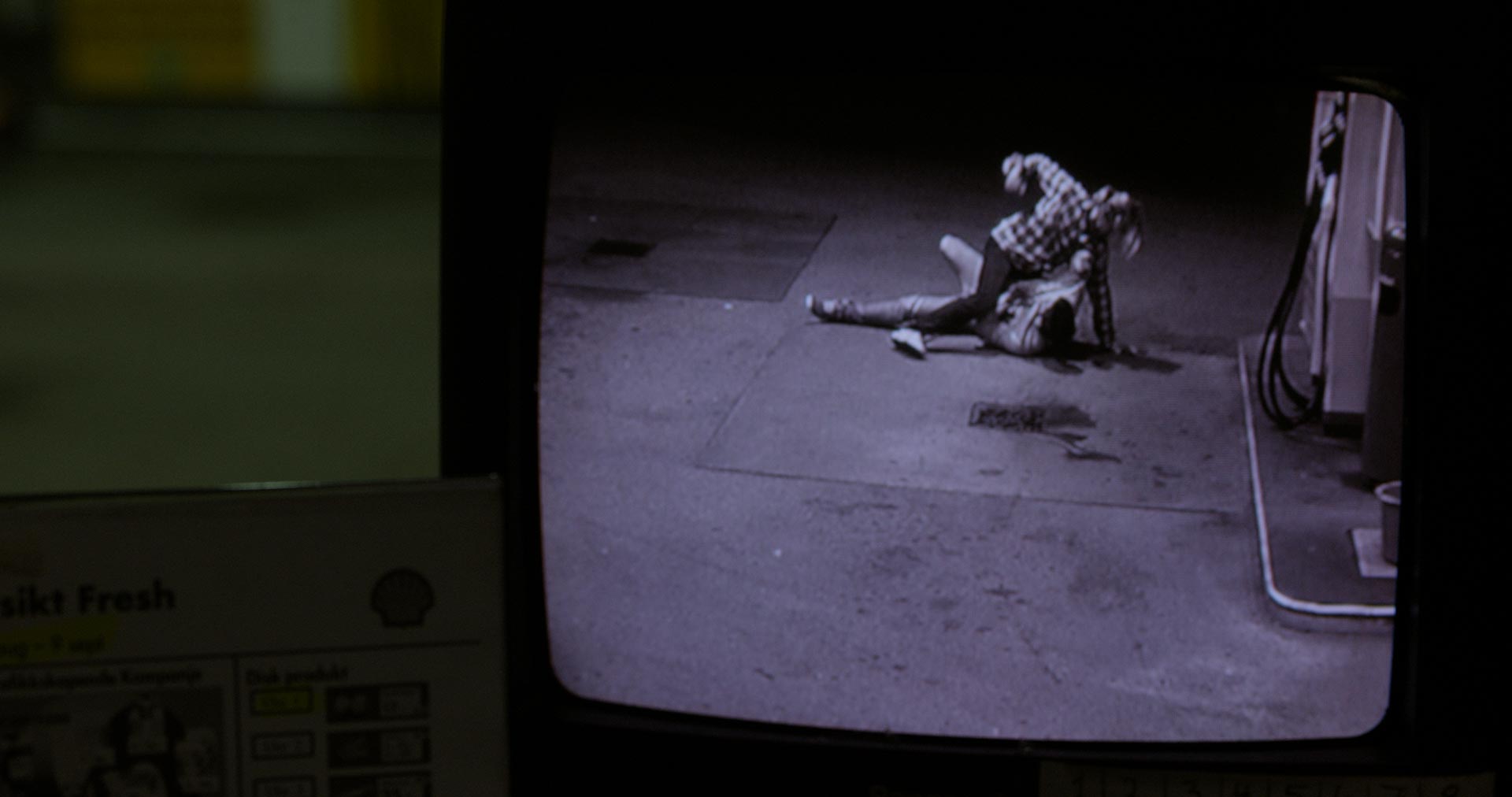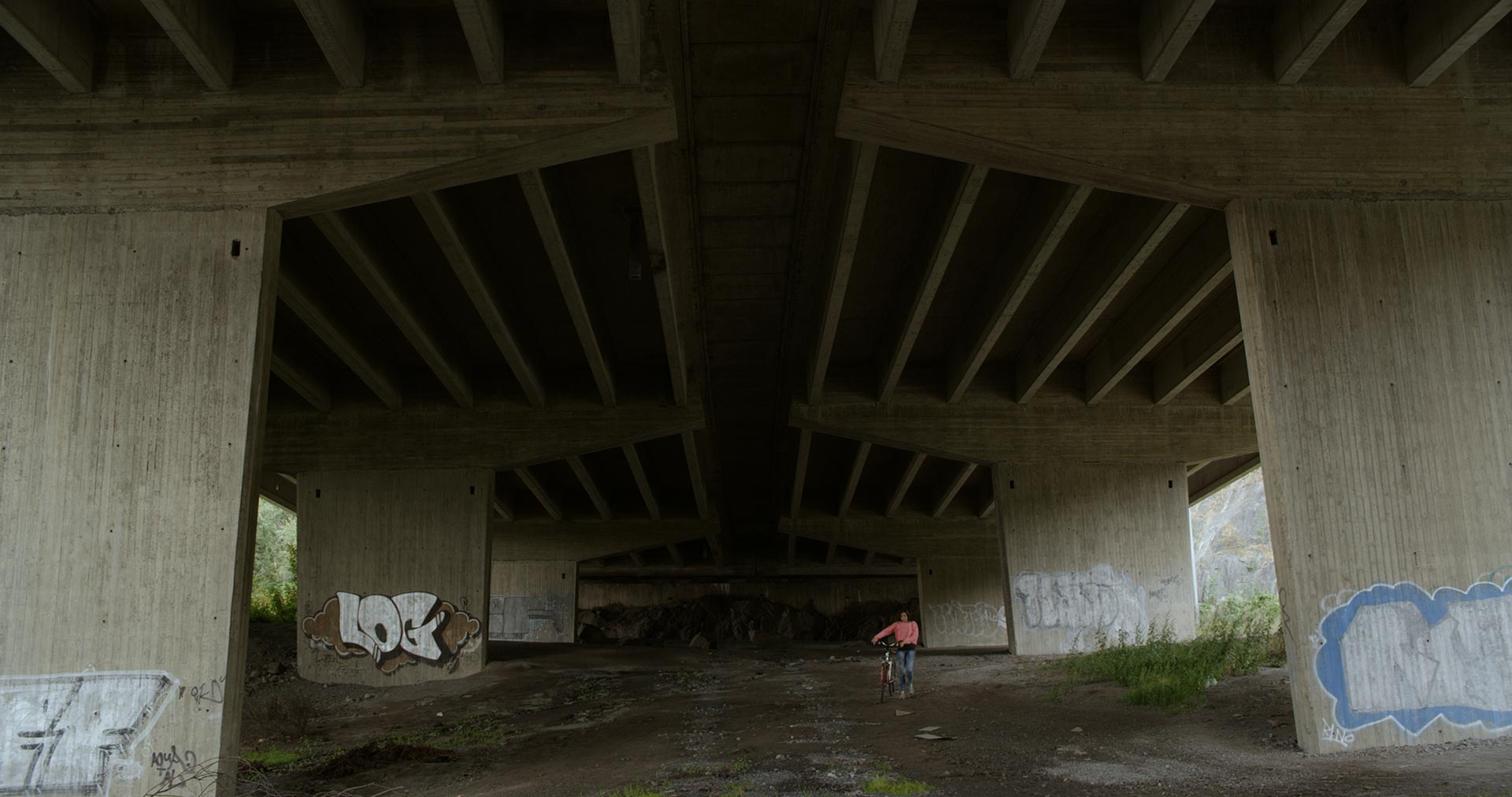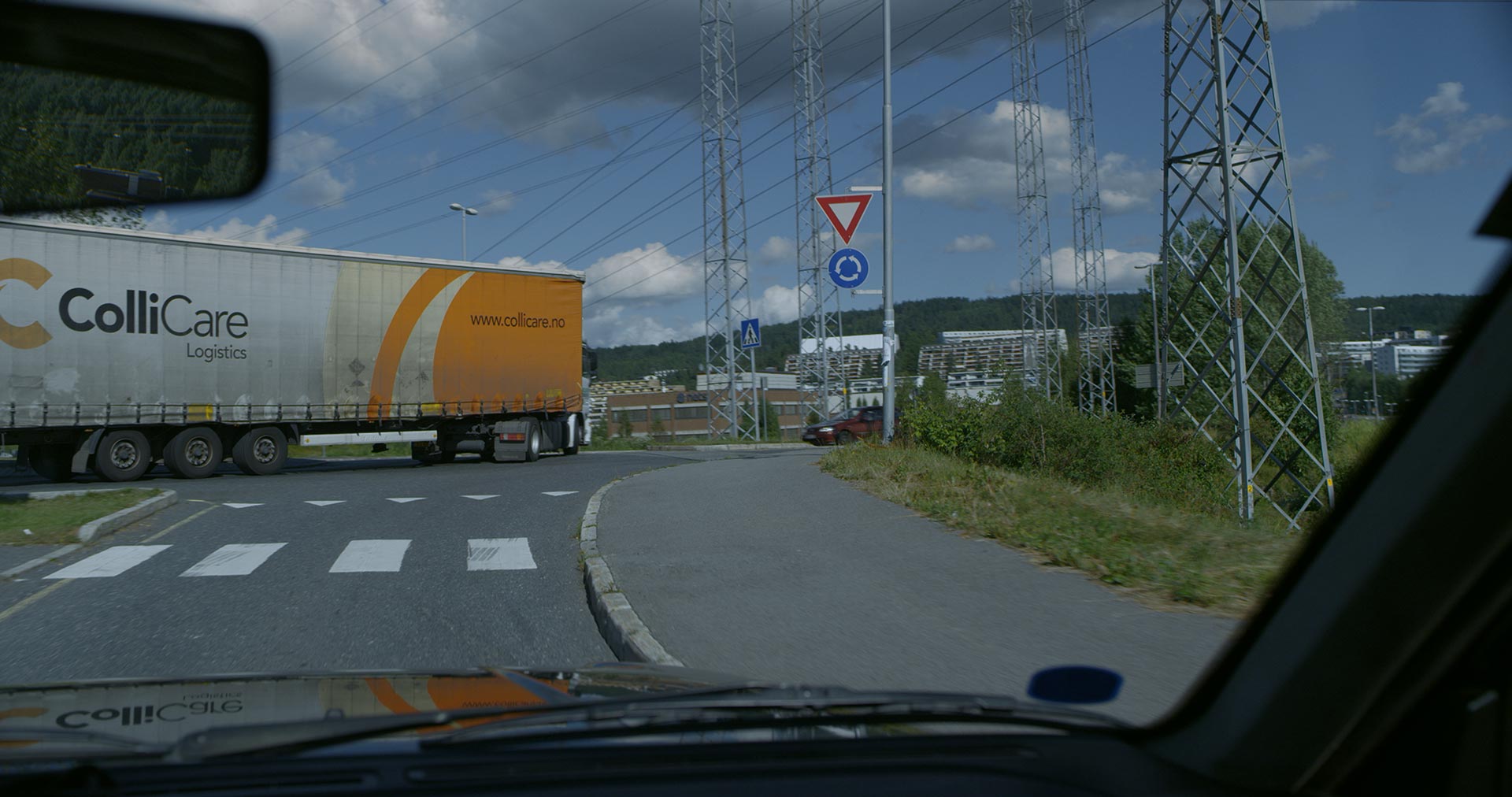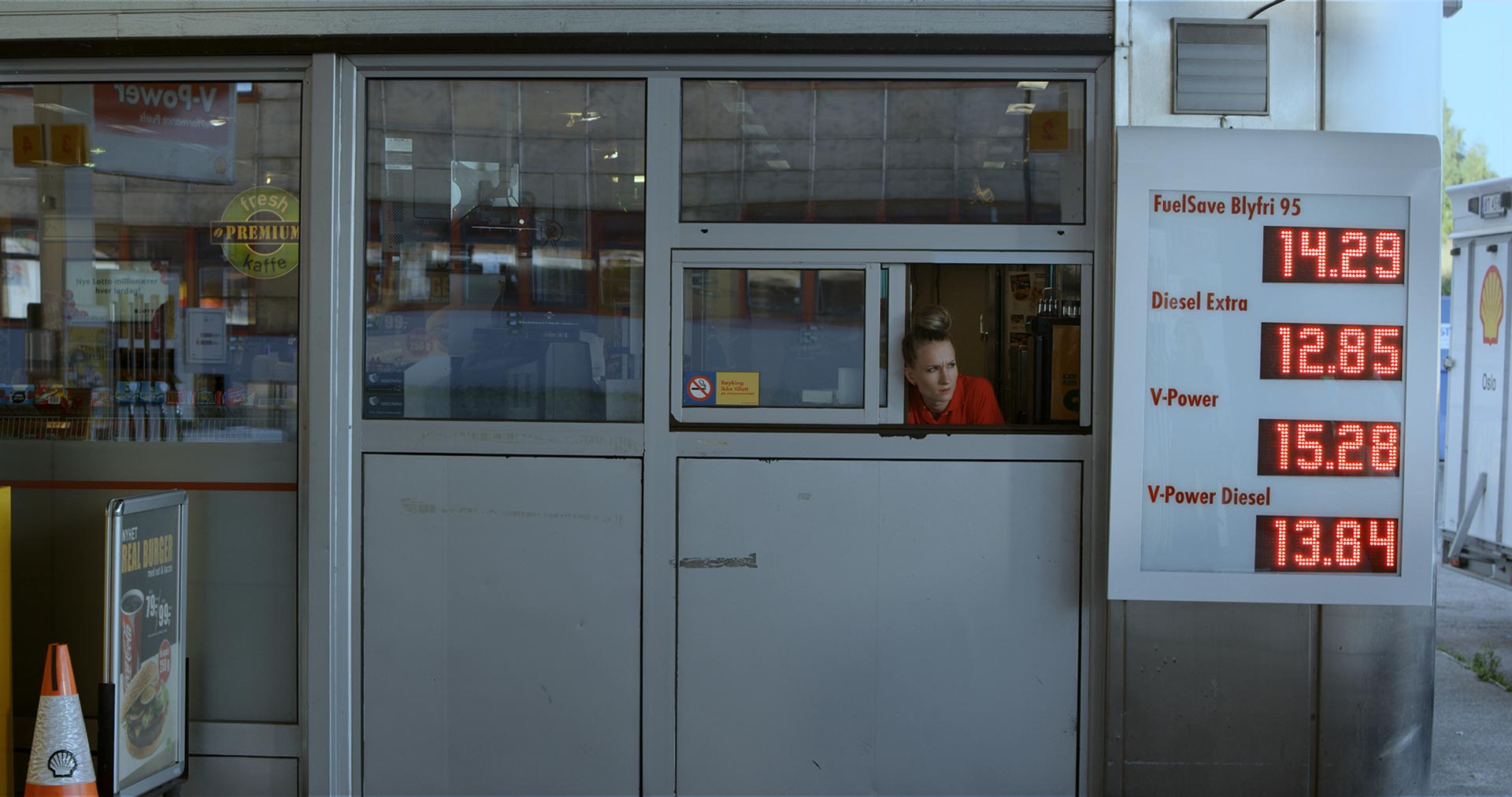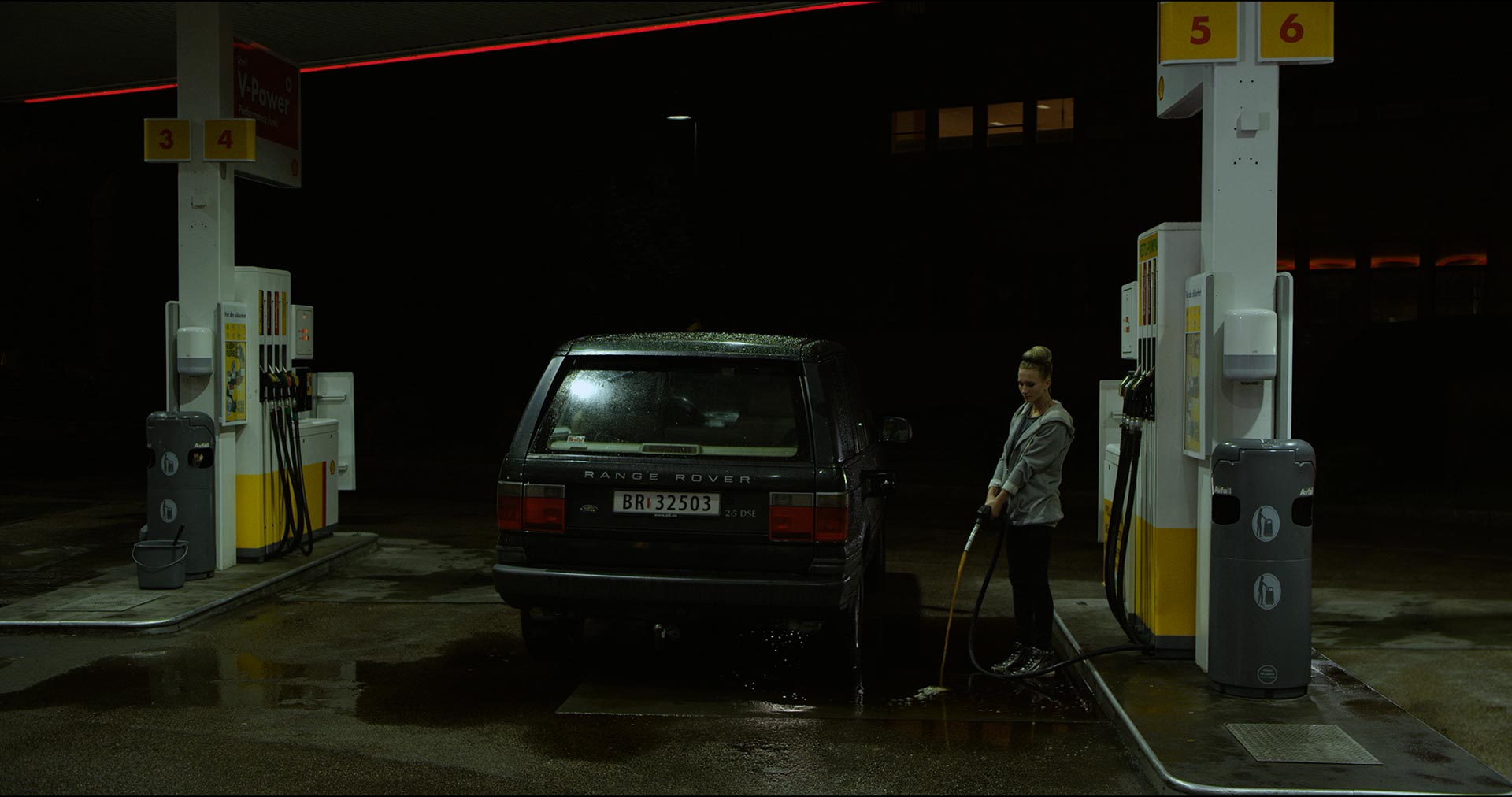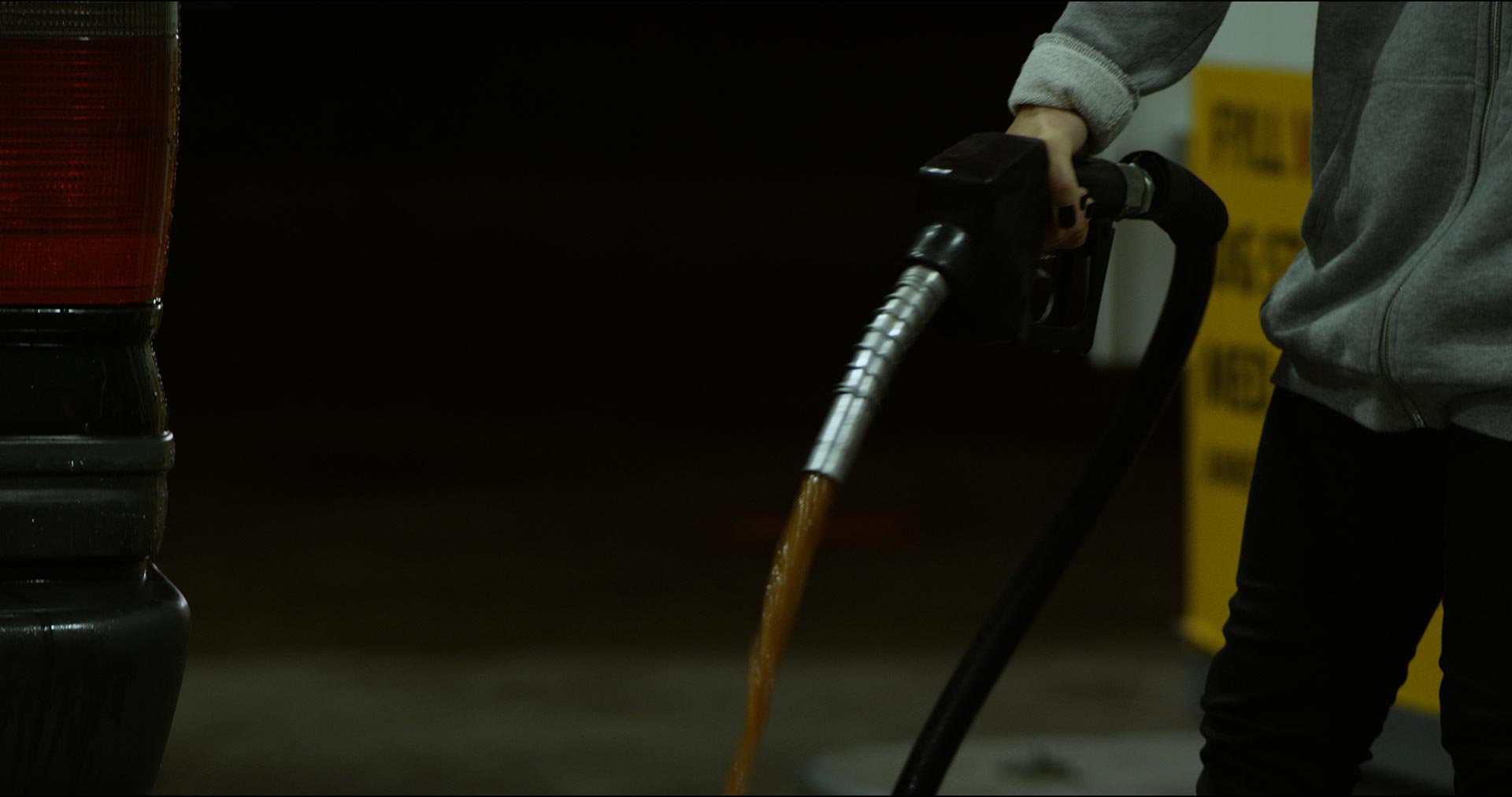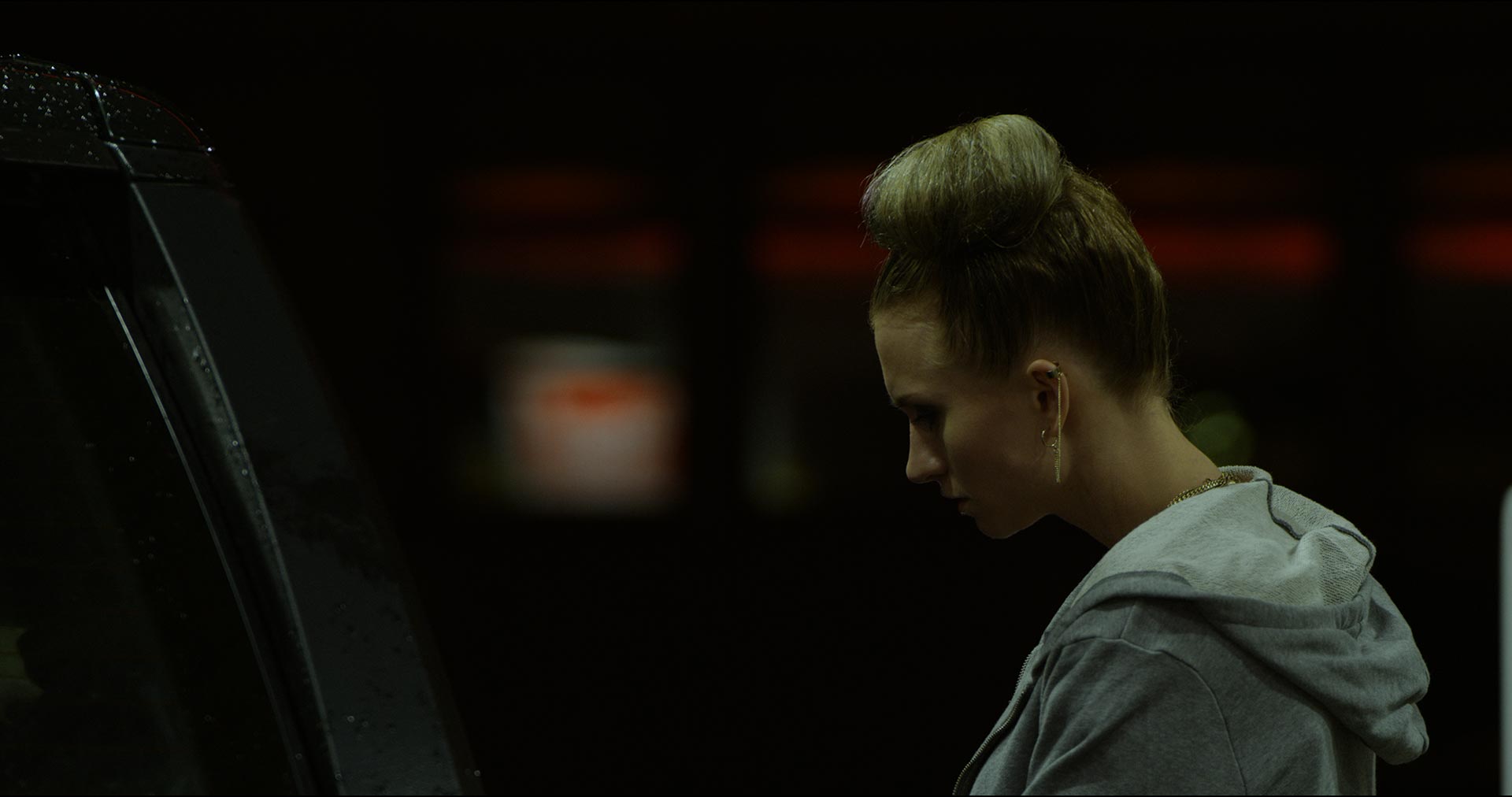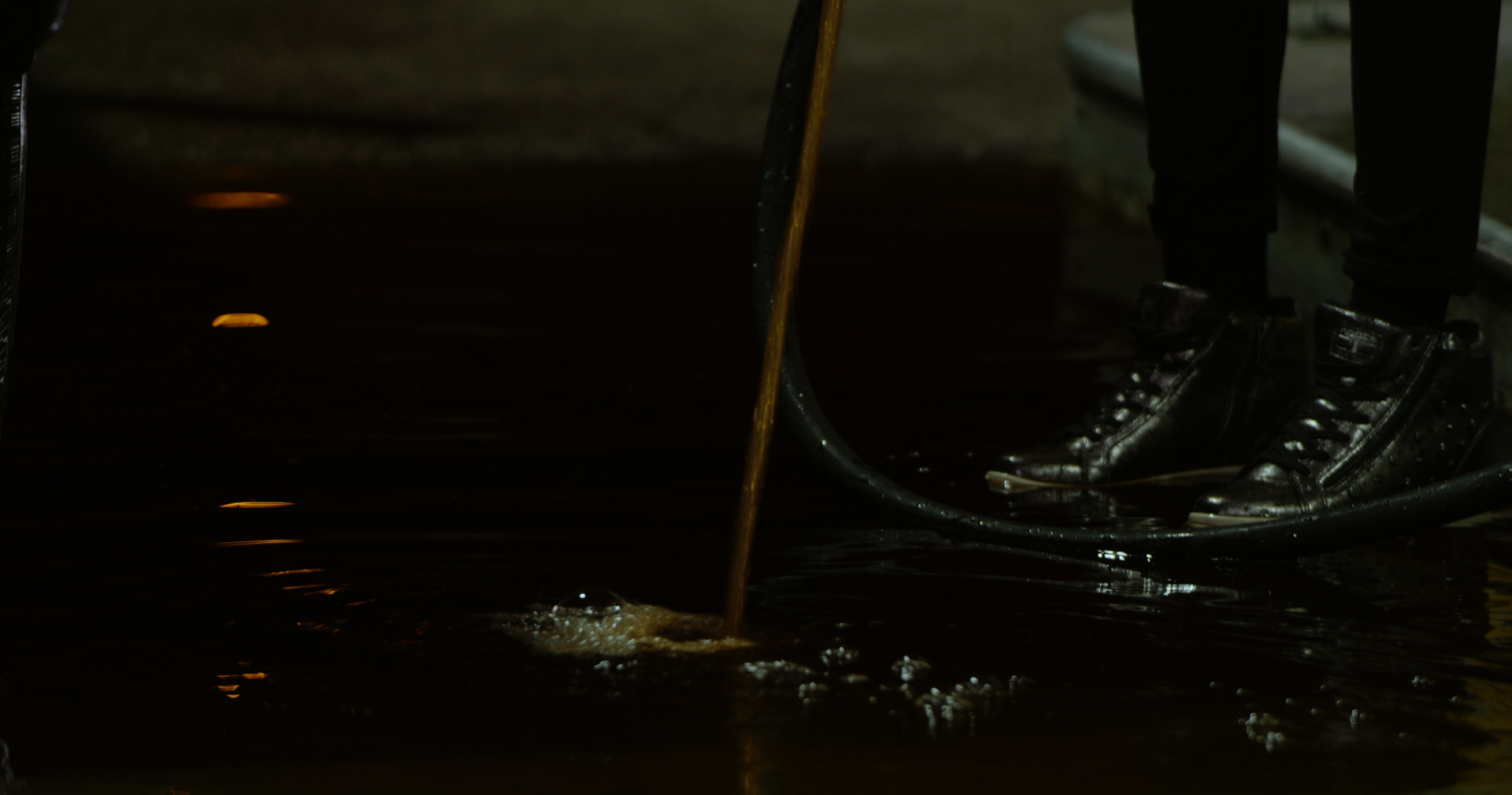Egress
5K to 2K, 41 min, colour, 5.1 audio. 2013
Egress is a narrative set in a gas station in the edgelands of Oslo. The main characters work at the bottom of the oil company hierarchy and are engulfed in the everyday and the dark economic and psychological shadows of their society. The main protagonist deals with her every day work situation with independence and stubbornness in her work and life in the periphery of the city. However, the film is saturated by consumer economy, work that is mostly the upkeep of surfaces that sell products, and and a sense of petro psychology that seeps into everything and that leads to both the implosion of violence by two men onto themselves, and the main character to fill the tanking area with diesel. These aspects are also carried on to the small diversions into nearby container housing for workers and suburban shopping and hosing complexes. There are small areas of transgression though - the seeming intimacy bewteen two other staff, in the playful conversations that wheel off to rank, class, and media concerns, - and of course the final bizarre scene with the flooding of the garage floor.
The film shows relationships between control and independence, about labour, class and work, but it is also a poetic film about a socially insecure edgeland of the city—and about a psychological flipside or cost of the everyday, somewhere near the bottom of the huge economic ladder of the oil industry which secures Norway's stability. Egress' world is a world of social instability and economic insecurity as part of a society undergoing major changes. Egress is shot entirely on "location" in Oslo's Groruddalen, mainly between an apartment complex and a gas station. The film is an experimental fiction built up from documentary material which mixes the environment- and character-based to talk about contemporary society.
---
"Asdam's camera lovingly details the aesthetics of the employees' minimum-wage labor. Shuffling packages of savory and sweet edibles under heat lamps or stealing candy bars as a matter of course, the disaffected employees are shown pumping gas and ringing up bottled water for passing motorists. The senseless, repetitive work is defined through their-and their nation's-relationship to oil, Norway's largest export. This same economic relationship structures the employees' landscape. The characters bark orders to one another in lieu of real communication as every interaction is defined in terms of useful labor. (For example, retelling a story of romance gone bad, one woman describes it as "more love hours than can ever be repaid," lifting a line from the 1987 Mike Kelley piece.) Georges Bataille described art as a glorious waste of excess energy; in the video's climax, the blond lead spills black gas on concrete as if washing it with oil, expending liquid energy-and money-in blatant defiance of any economic logic."
From Artforum Critics' Picks, by Maika Pollack, Artforum
“Some of the most exiting fiction films I have seen in recent years are made by Norwegian Visual Artists, whether it’s the spot on depiction of life at a gas station by Knut Åsdam in his film, Egress…”
Ulrik Eriksen for Morgenbladet, 6-12. December 2013
“…Egress by Knut Åsdam is close to its characters as the camera drifts around the employees at a gas station, sorting goods and dealing with costumers, while intrigues are lurking behind vague dialogues. Establishing shots reveal, in between, the infrastructure such as roads and tall apartment complexes. Åsdam wisely inserts these, adding a larger perspective to the narrow drama. In the symbolic last scene the lead character holds the oil pump to the ground letting the oil run out around her feet. The films’ social realism and narrow form could implement a passage out of the art room. The precarious screening situation – Egress is screened inside a lorry outside Kunstnernes Hus – also releases the film (symbolically) from the institution.”
Stian Gabrielsen for Kunstkritikk, 3. March 2015
“To watch the film wrapped in an aesthetic reminiscent of a container, works as a pedantic triumph seeing as the visuals, as well as the audio, are lifted to an unusual high level of wholeness.”
Nøyaktighetens Pris, Gustav Borgersen for ArtScene Trondheim 19. October 2013
“The character depictions are especially impressive in this piece. Åsdam convincingly portrays life at a gas station through the precise cinematic language, translating the main character Y’s, both sympathetic and partly inexcusable personality formed by the physical and social surroundings along with the relations to her boss, co-workers and customers at the gas station where she works”.
Eva Rem Hansen for Kunstkritikk, 14. October 2013.
Watch at www.vimeo.com/knutasdam/egress - you will need a password from us.
The film shows relationships between control and independence, about labour, class and work, but it is also a poetic film about a socially insecure edgeland of the city—and about a psychological flipside or cost of the everyday, somewhere near the bottom of the huge economic ladder of the oil industry which secures Norway's stability. Egress' world is a world of social instability and economic insecurity as part of a society undergoing major changes. Egress is shot entirely on "location" in Oslo's Groruddalen, mainly between an apartment complex and a gas station. The film is an experimental fiction built up from documentary material which mixes the environment- and character-based to talk about contemporary society.
---
"Asdam's camera lovingly details the aesthetics of the employees' minimum-wage labor. Shuffling packages of savory and sweet edibles under heat lamps or stealing candy bars as a matter of course, the disaffected employees are shown pumping gas and ringing up bottled water for passing motorists. The senseless, repetitive work is defined through their-and their nation's-relationship to oil, Norway's largest export. This same economic relationship structures the employees' landscape. The characters bark orders to one another in lieu of real communication as every interaction is defined in terms of useful labor. (For example, retelling a story of romance gone bad, one woman describes it as "more love hours than can ever be repaid," lifting a line from the 1987 Mike Kelley piece.) Georges Bataille described art as a glorious waste of excess energy; in the video's climax, the blond lead spills black gas on concrete as if washing it with oil, expending liquid energy-and money-in blatant defiance of any economic logic."
From Artforum Critics' Picks, by Maika Pollack, Artforum
“Some of the most exiting fiction films I have seen in recent years are made by Norwegian Visual Artists, whether it’s the spot on depiction of life at a gas station by Knut Åsdam in his film, Egress…”
Ulrik Eriksen for Morgenbladet, 6-12. December 2013
“…Egress by Knut Åsdam is close to its characters as the camera drifts around the employees at a gas station, sorting goods and dealing with costumers, while intrigues are lurking behind vague dialogues. Establishing shots reveal, in between, the infrastructure such as roads and tall apartment complexes. Åsdam wisely inserts these, adding a larger perspective to the narrow drama. In the symbolic last scene the lead character holds the oil pump to the ground letting the oil run out around her feet. The films’ social realism and narrow form could implement a passage out of the art room. The precarious screening situation – Egress is screened inside a lorry outside Kunstnernes Hus – also releases the film (symbolically) from the institution.”
Stian Gabrielsen for Kunstkritikk, 3. March 2015
“To watch the film wrapped in an aesthetic reminiscent of a container, works as a pedantic triumph seeing as the visuals, as well as the audio, are lifted to an unusual high level of wholeness.”
Nøyaktighetens Pris, Gustav Borgersen for ArtScene Trondheim 19. October 2013
“The character depictions are especially impressive in this piece. Åsdam convincingly portrays life at a gas station through the precise cinematic language, translating the main character Y’s, both sympathetic and partly inexcusable personality formed by the physical and social surroundings along with the relations to her boss, co-workers and customers at the gas station where she works”.
Eva Rem Hansen for Kunstkritikk, 14. October 2013.
Watch at www.vimeo.com/knutasdam/egress - you will need a password from us.
